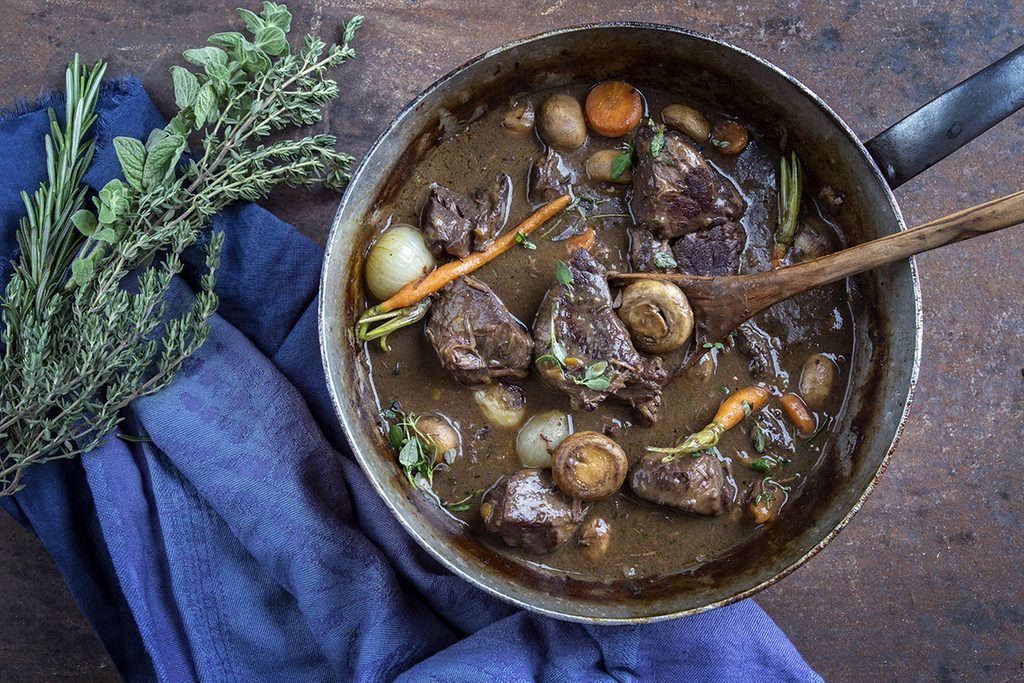What I Learned From the Last Meal My Mother Ever Cooked for Me
Updated: May 08, 2019

Now when I make her beef bourguignon, I realize how I've moved from fury to forgiveness.
It’s Easter, and I’ve decided to make my hero Julia Child’s beef bourguignon, the only recipe I make that my mother also made while I was growing up.
Beef bourguignon isn’t really a spring dish. Our corner supermarket doesn’t have small onions; it stocks them only for big winter holidays. so I have to settle for frozen.
It’s the only Julia dish my mother made, but I cook it only maybe once a year because doing so makes me so sad that when I’m done, I can rarely bring myself to eat it.
During my first semester of college, my mother, only 46, was diagnosed with brain cancer, an astrocytoma with the shape and reach of a starfish. That summer, she had suffered from crushing headaches and double vision. Her doctors decided it was an underactive thyroid, then hypoglycemia, then menopause. Her headaches had persisted, and miraculously, so did her elaborate nightly meals. There is no summer longer than the one before college; your old life has wilted, but your new life has yet to bloom. In the afternoons, I watched my mother wash down three aspirin with a swig of Coors before getting something on to simmer. How on earth did she manage this, and why?
They were able to remove part of her tumor, but only part. The prognosis was dire. My mother, according to her surgeon, woke up, looked him straight in the eye, and “asked all the hard questions.” She was given six months to live but managed only three.
By February, she had completed her prescribed rounds of radiation and chemotherapy. My parents had been steadfast in shielding me from the horror of it all. I was a mere 17. I’d gone away to USC, my father’s alma mater, pledged a sorority and was dutifully having the time of my life. They insisted.
My birthday is March 2, and suddenly, uncharacteristically, my father called and summoned me home on Sunday for my birthday dinner.
I was happy. Home meant presents, cake and my choice of fancy dinner. In the naive way of children to whom nothing bad has ever happened, I assumed that if my mom was cooking me a birthday dinner, then she was better and was going to be OK.
The fanciest special-occasion food I knew was steak and baked potatoes with sour cream and chives, and that’s what I asked for. Also, a green salad with Bob’s Big Boy Bleu Cheese dressing. I knew there would also be some kind of store-bought cake from the grocery store.
But that Sunday, the moment I walked in the door, I took one whiff and knew we weren’t having steak. It was that smell I knew so well: the buttery, floury, slightly blood-infused smell of browning beef on a too-warm day. My mother was setting our places at the big dining room table, one utensil at a time. She wore her usual capris, bright floral top and an orange turban to hide what she called her bald chicken head.
I felt the sense of injustice rising up in me. It wasn’t fair! They’d called and asked what I wanted and I’d said steak, and there was no steak. Instead, my mother was cooking beef bourguignon. I didn’t even dislike beef bourguignon, but it was not steak. No steak. No baked potato with sour cream and chives. No green salad with Bob’s Big Boy Bleu Cheese dressing. And also, no cake. And soon, no mother; the person I loved most in the world was leaving me.
I followed her into the kitchen. We didn’t talk. She couldn’t talk well after her brain surgery. She leaned against the counter, her redhead’s pale complexion mottled and her face slack and puffy from her meds, removing each piece of beef from the pan with the focus and precision of someone defusing a bomb.
I think she made a few simple things before she died a week later, but Julia’s beef bourguignon was the last thing she made for me.
When I made the dish last Easter, I rushed through the browning of the stew meat, ruining my favorite hoodie with splattered oil. I also wound up with an extra plate of sautéed carrots and onions. I spent most of my young adulthood furious that my mother had solicited my opinion about what I wanted for my birthday dinner and then didn’t cook it. Then I moved into a phase where I realized I was really angry at her not for her menu planning but for dying and leaving me alone, for that is how I thought of being left with my well-meaning silent father. Now that I have lived past the age at which she died and have a daughter older than I was when she got sick, I can only imagine the sheer terror she must have felt at the thought of dying and of leaving me to make my way in the world without her.
Then, in a further iteration, over the course of the long Easter afternoon, while I stood in front of the stove turning and basting the beef, I found myself admiring her courage. Her days were numbered, she knew it, and she was going to spend her last days at the stove making something that gave her pleasure.
